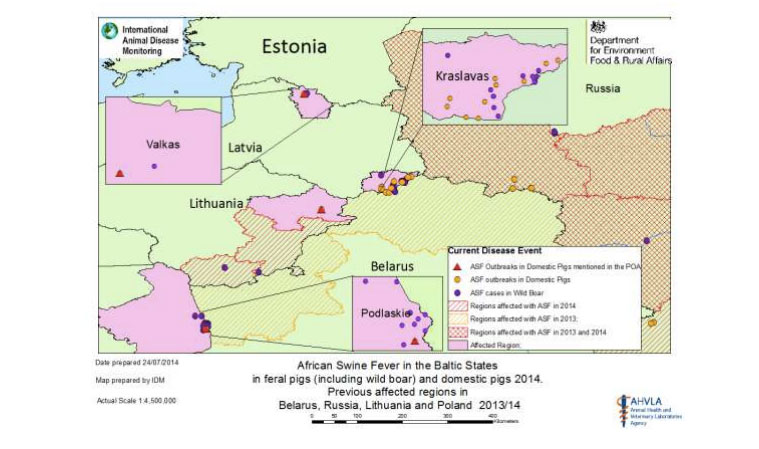
There have been three further reports of African Swine Fever (ASF) in domestic pigs in Lithuania, Latvia and Poland. In all three countries statutory disease control measures are in place in accordance with Directive 2002/60/EC.
The Lithuanian Authorities have reported an outbreak of ASF on a large commercial holding of 20,000 pigs close to the border with Belarus and Latvia. The Latvian Authorities have reported two new incidents of ASF over 200km west of the existing ASF and CSF control zones (European Commission, 2014). This new area is close to the Estonian border, where disease has not previously been reported.
It is not yet known how ASF has moved into this new area. One boar that was found dead tested positive and an outbreak on a backyard holding where 4 of 9 breeding sows were positive out of a total herd of 56 pigs. These incidents are 1km apart. The Polish Authorities have reported a new outbreak of ASF in a backyard holding of 8 pigs 2.5km from the border with Belarus. There have been an increasing number of cases reported in wild boar within recent weeks in the direct locality, but this is the first time ASF has been reported in domestic pigs in Poland.
Since the wild boar cases were detected along the Belarus border in February, Poland and Lithuania have been carrying out a high level of testing of feral pigs / wild boar and domestic pigs in the areas where disease control measures are in place, as well as wider afield. It is significant however that the outbreak in Lithuania represents the first outbreak of ASF on a commercial holding within the EU. The holding is a considerable distance from any of the reported cases of ASF in wild boar and is outside existing control zones. At present it is unknown how the disease got onto the holding.
This is the first outbreak of ASF in domestic pigs (backyard holding) in Poland but ASF cases have been reported in wild boar since February. It is within the region already under ASF trade restrictions. The two reports in Latvia are in a new infected region, not previously under ASF control measures. Preliminary epidemiological investigations indicate a possible source of infection is through contaminated feed ) and is not believed to be through contact with or movement of infected wild boar from another region. According to The EU TRACES system indicates there have been no recent imports of live pigs from Poland, Latvia or Lithuania to UK.
This is the first time there has been an ASF outbreak recorded on a commercial holding within the EU Border region. The region was not under existing disease control measures and there will be concerns this is a more widespread problem. How long disease was present on the farm and how much pig or vehicle movement occurred before infection was detected will be paramount to investigations.
The risk of disease incursion into the UK through the legal movement of pigs or products of animal origin as a result of this report we now would consider to be low while investigations are carried out. The risk of incursion of any notifiable exotic disease from any affected area through illegal movement of products of animal origin and subsequent swill feeding or poor on-farm biosecurity is considered to be low.
The lack of epidemiological links between the wild boar cases and backyard outbreaks in Latvia, and also the new outbreak on the commercial premises in Lithuania, emphasises the difficulty there is in preventing disease incursions in such regions if there is not strict adherence to official controls and biosecurity on farm. We would therefore like to remind all livestock keepers the legal requirement to report to AHVLA any suspicion of notifiable disease and that swill feeding to pigs is prohibited.
